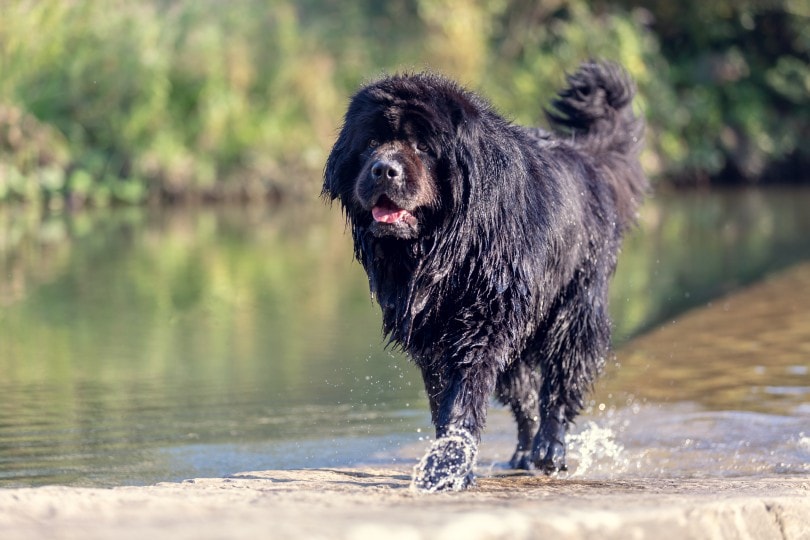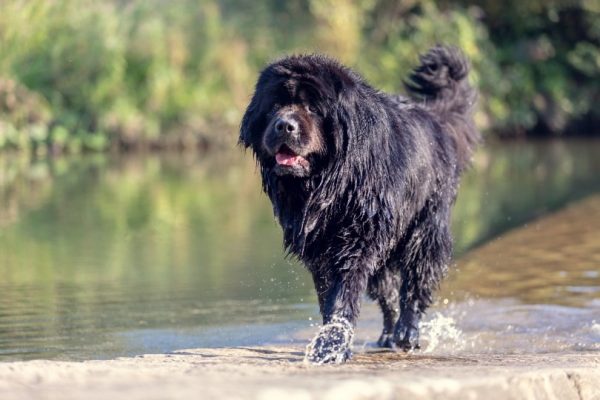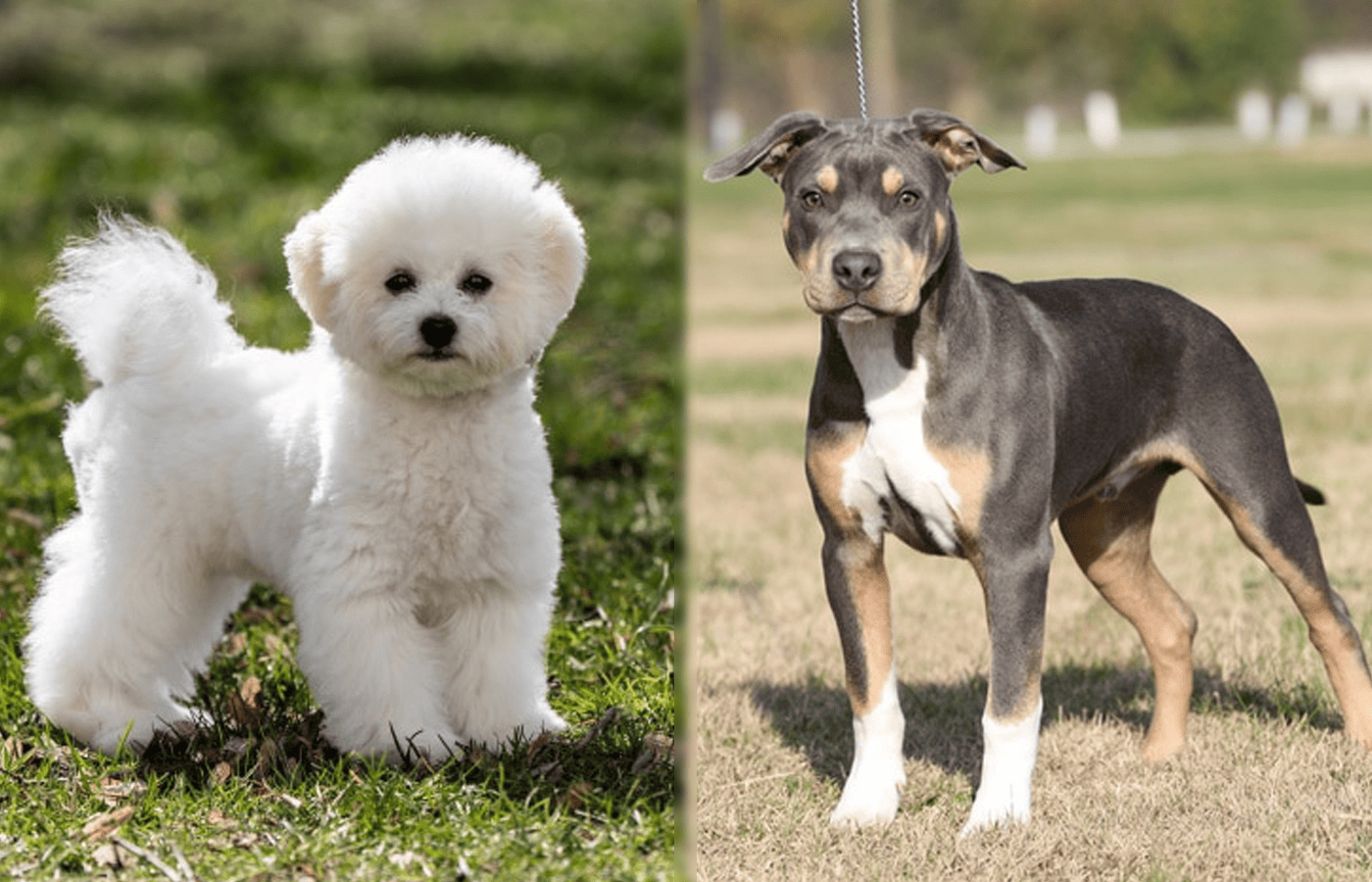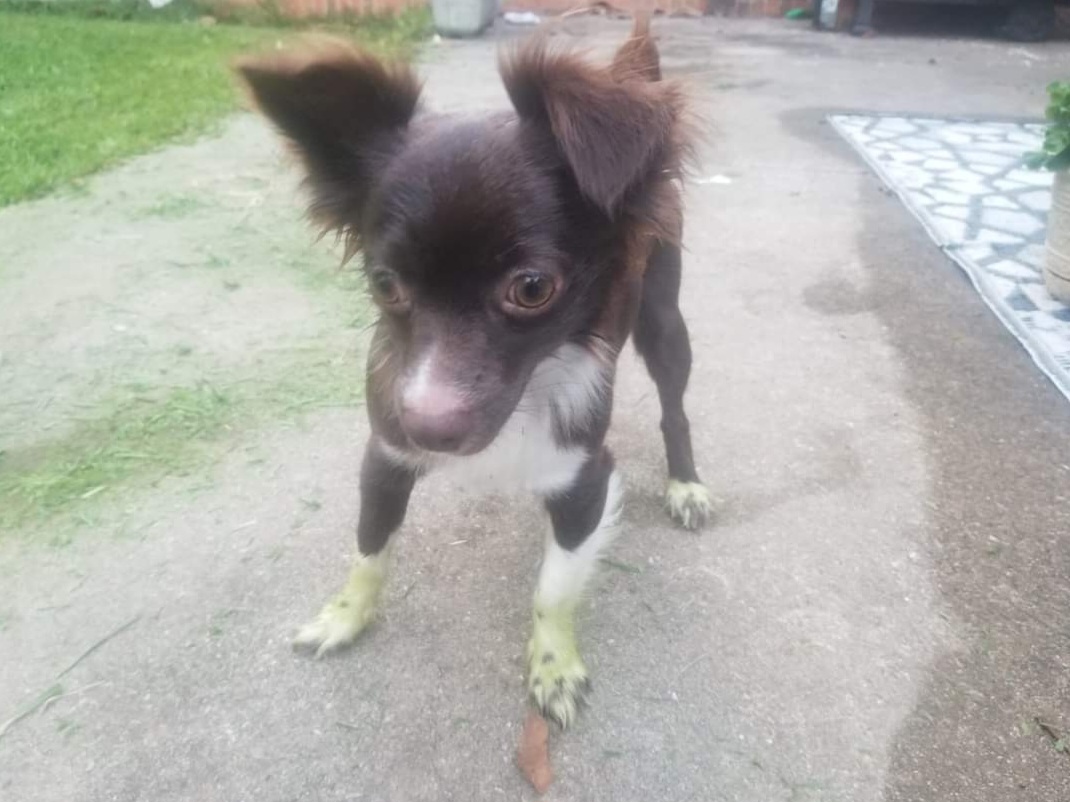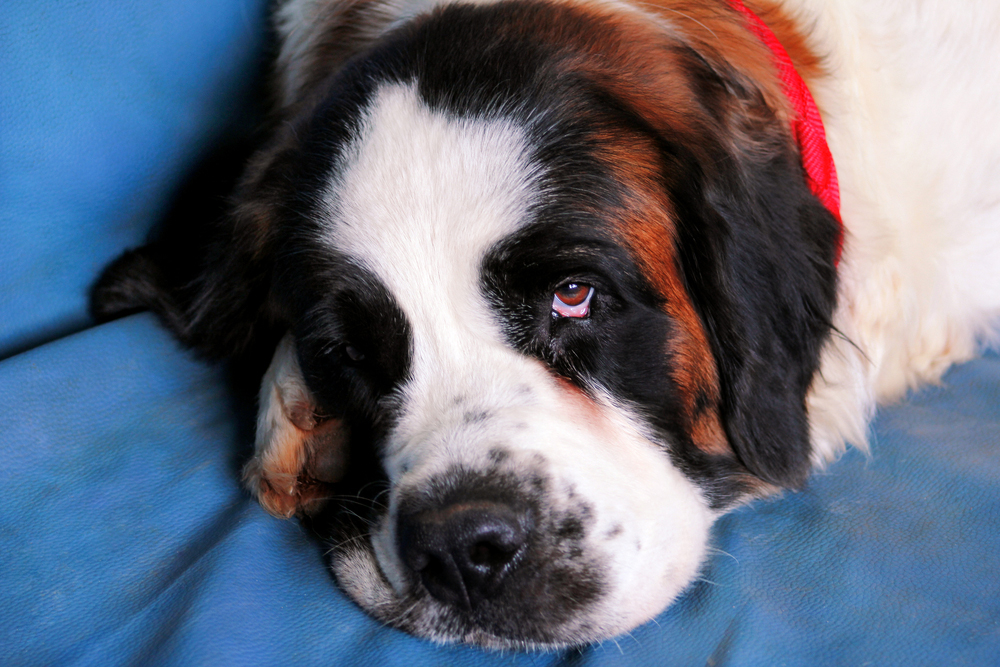Click to Skip Ahead
Dogs have been our beloved companions for centuries, but if you’re an allergy sufferer as well as a dog lover, it is pretty frustrating! Now you’re on a quest to find the best hypoallergenic breeds, but what if the breed you love most is the Newfoundland?
Are these dogs hypoallergenic? Unfortunately, the Newfoundland dog is not hypoallergenic whatsoever. If you or someone in your family has severe dog allergies, you should consider other breeds and consult with your allergy specialist.
That said, there are a number of steps you can take which will make living with the Newfoundland dog more manageable. Plus, we’ll discuss what makes a dog hypoallergenic.

What Makes People Allergic to Pets?
It’s a common misunderstanding that we are allergic to dog hair. But it’s not the hair we’re allergic to, but proteins found in their dander, saliva, urine, and sweat. So far 7 allergens have been discovered, Can f-1 to Can f-7.
Dander tends to be the main problem because it’s small and light and attaches to the hair, which is launched into the home. Then it lands on all surfaces, including your furniture, clothing, carpet, and walls. And from there, it ends up in your lungs and in your eyes, and off goes the allergies!
Just to reiterate, the dander and saliva attached to the hair cause allergic reactions. So, the more the dog sheds, the more the allergy-triggering dander comes with it, in theory.
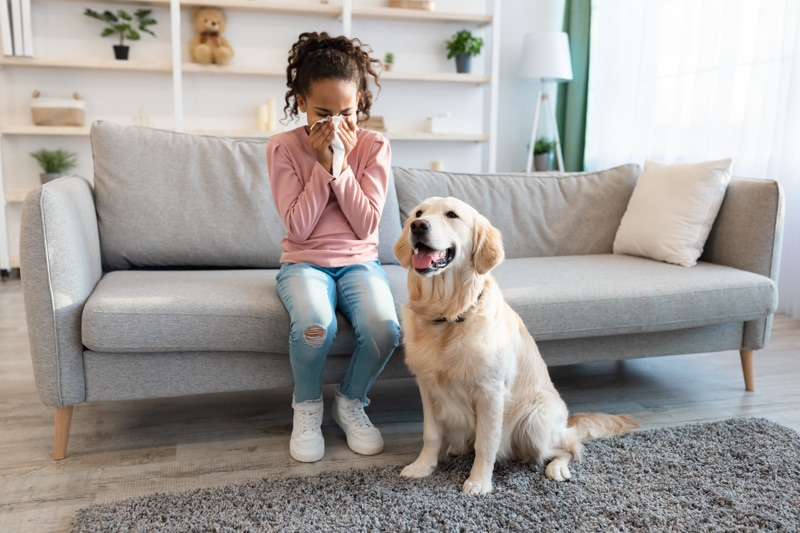
Why Are Some Dogs Hypoallergenic?
We should mention that there really is no such thing as a completely hypoallergenic dog. All dogs have saliva and dander, but it is commonly thought that the less a dog sheds, the less chance of allergies being triggered, which is where the hypoallergenic breeds come in.
Studies have not necessarily backed this up though. With one 2005 study showing that labradors produced less allergens than the other breeds tested1, and another showing more allergens on the dogs thought to be hypoallergenic.2
There are quite a few breeds generally thought to be hypoallergenic, but this will never be 100%. Regardless of the breed, a fair amount of cleaning will always be necessary. It is also recommended that if you want to get a dog and suffer from allergies that you should at first consult with your allergist and secondly go and meet the individual dog to see if it triggers your allergies.
Why Isn’t the Newfoundland Hypoallergenic?
The Newfoundland dog has a number of strikes against them for allergy sufferers. First of all, Newfies have heavy, wavy, and semi-long double coats, and with a coat like this, they are also heavy shedders.
Next, they are a giant breed, so that’s a lot more fur flying everywhere than from a smaller dog. And when you hit the spring and fall shedding seasons, it’s pretty much twice the fur from a double-coated giant dog!
Finally, remember that the protein is also found in saliva? The Newfoundland has droopy jowls, which also means they drool pretty excessively. Every time they shake their heads, they send that allergy-laden saliva everywhere!
Why Do Dogs Shed More in the Spring and Fall?
When the weather starts cooling down in the fall, dogs shed their lighter summer coats and grow in heavier and warmer coats. And, of course, in the spring, the Newfie will shed that heavier coat for the thinner and lighter summer coat.
Dogs like the Newfoundland will shed profusely at these times, which will be too much for allergy sufferers. Newfies should be brushed several times a week to prevent mats, but during the shedding seasons, they will need brushing every day.
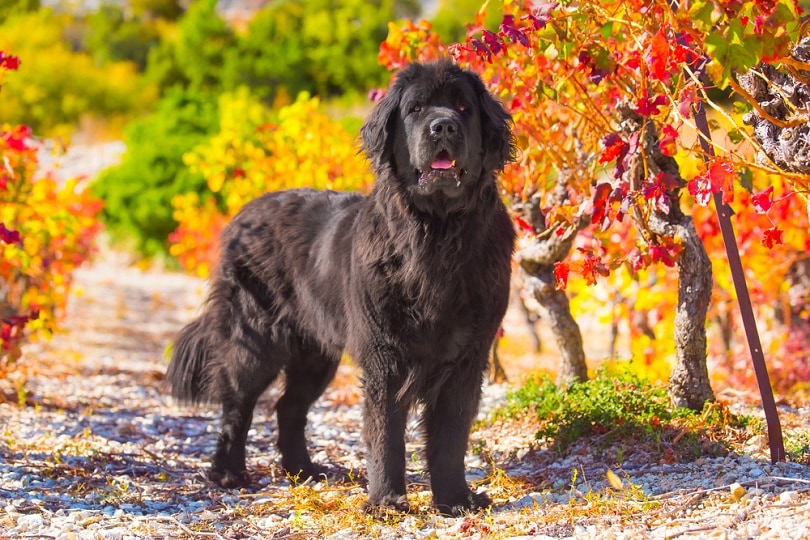
Are You Only Allergic to Male Dogs?
Here is some potential good news for some of you allergy sufferers out there! Experts have found that about 30-40% of allergy sufferers are actually allergic to the prostate protein, Can f-5, which is only found in male dogs.3
This means some people with dog allergies might not be allergic to female dogs. You need to take a special blood test to determine if you’re one of the lucky 40%, so you should speak to your doctor if you’re interested in taking the test.
You might be able to take a female Newfoundland home and not suffer from any dog allergies!
Can an Allergy Sufferer Live With a Newfoundland?
Unless you know you’re safe with a female dog, there are several steps you can take to help keep your allergies manageable, but it means doing a lot of cleaning!
However, if the allergies are severe, you would be better off considering a different type of pet.
Tips for Controlling Allergens in a Newfoundland Dog
1. Brushing
We discussed brushing your Newfie earlier, but frequently brushing this dog is a great way to reduce the loose hair coming off them. Consider using a family member without allergies or a groomer rather than doing the brushing yourself.
But the more loose hair taken from your dog, the less hair will be in your home. And needless to say, the brushing should be done outside or in an enclosed porch or something along those lines. Some dogs can be trained to accept grooming with special vacuum cleaners.
2. Bathing
The Newfoundland needs a bath about once every 8 weeks or when necessary (muddy dog, for example). Bathing your dog helps to remove the excess dander and hair but ensure you only use dog shampoo. Keep in mind you should brush your dog thoroughly before every bath.
Look for shampoos that use natural ingredients like oatmeal or aloe vera, which can be quite moisturizing. Bathing your dog too frequently or using a shampoo not meant for dogs will dry out their skin, which will only make the shedding and dander much worse!
3. Bedroom Restrictions
Your bedroom is one of the more important rooms in your home because experiencing allergies will most definitely interrupt your sleep! If there’s another room you spend a lot of your time in, you might need to make this one dog-free as well.
Keeping your Newfie out of your bedroom means never allowing them in the room. Make sure everyone in your family knows this rule as well.
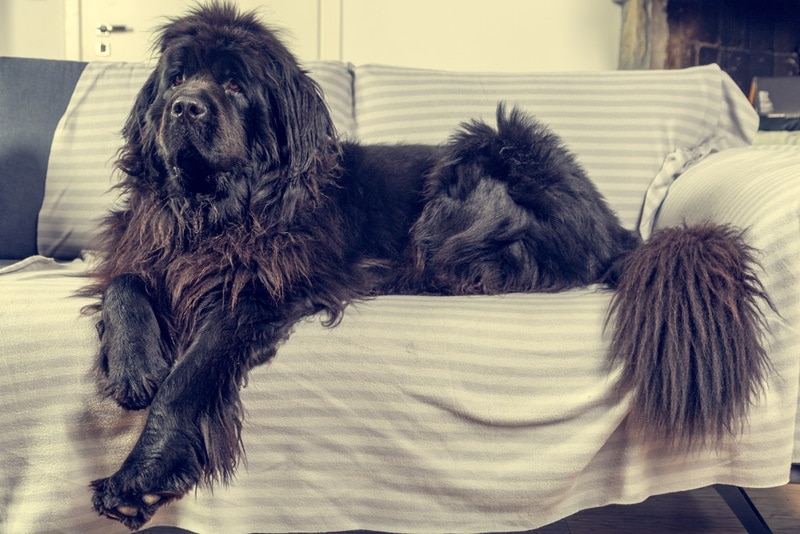
4. HEPA Air Filters
HEPA filters are able to remove approximately 99.7% of particles in the air, depending on the filter. You can place air purifiers in key spots in your home, which should help remove a lot of the allergens.
5. Lots of Cleaning!
Start by dusting all surfaces, including your walls, with a damp cloth. You’ll also want to invest in a good HEPA vacuum cleaner because you’ll be using it a lot!
Locate a vacuum that is also advertised as a pet vacuum because they come with special attachments. You’ll need to use it several times a week.
Some feel you should vacuum daily, but that isn’t always possible, so just vacuum as often as possible. Vacuum every surface, such as your curtains, carpets, upholstery, and especially your dog’s bed.
6. Good Diet
The better your dog’s diet, the better the coat quality, which can help lessen the shedding. Giving your dog high-quality dog food is essential – food that contains omega fatty acids will help to keep their coats moisturized.
If you believe your dog has skin issues, like overly dry skin, speak to your vet. They can check your dog out and give you advice on the kind of food you are using or if there might be an allergy problem. There are also supplements you can add to your dog’s food.
7. Go to a Professional
If you haven’t seen an allergy specialist, this might be a good time to do this. They can test you for all of your allergies. Maybe you’re not allergic to dogs but something in your environment.
You can also consider allergy shots, which are quite good at lessening the symptoms for a period of time. Of course, there are the usual nasal sprays and antihistamines.


Hypoallergenic Breeds
If it comes down to it and the Newfoundland sounds like too much work, you can consider several other dog breeds. Dog breeds that shed less tend to be more popular with allergy sufferers but none are actually hypoallergenic.
- Basenji
- Afghan Hound
- American Hairless Terrier
- Bedlington Terrier
- Bichon Frise
- Chinese Crested
- Coton de Tulear
- Havanese
- Irish Water Spaniel
- Kerry Blue Terrier
- Lagotto Romagnolo
- Maltese
- Peruvian Inca Orchid
- Poodle
- Portuguese Water Dog
- Schnauzer
- Soft Coated Wheaten Terrier
- Shih Tzu
- Spanish Water Dog
- Xoloitzcuintli
While none of these dogs really resemble the Newfoundland, you might still find one that will make an excellent companion for you.
And again, we just want to remind you that there’s no dog that’s 100% hypoallergenic. But they still might be easier to live with than a dog like the Newfie.
Final Thoughts
If you are still onboard with the Newfoundland, one critical point we want to stress is to never shave them.
Breeds like the Newfie with double coats depend on their undercoat to protect against sun damage, parasites, wind, and weather extremes – their undercoat helps them against both cold and hot weather.
Yes, owning a Newfoundland as an allergy sufferer will undoubtedly be challenging. But if you can make it work, it’s all worth it to have one of these lovely dogs as a part of your family!
Related Reads:
- Is a Great Dane Hypoallergenic? Vet Approved Facts & FAQ
- Are Goldendoodles Hypoallergenic? Vet-Approved Facts & Tips to Reduce Allergens
Featured Image Credit: rzoze19, Shutterstock

